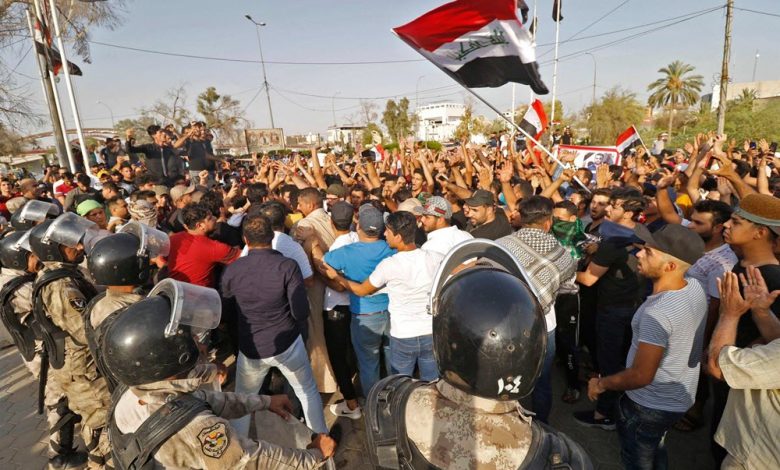Arba’een and Mullahs’ Regime

Written by Mansoureh Galestan
Next week is Arba’een, the Shi’ite Muslim’s second holiest religious ceremony, next to Ashura. The Iranian regime has spent an entire year planning for the event. It has mobilized all its official media outlets to turn Arba’een into a mullahs’ sponsored religious ritual.
The clerical regime pretends that nothing bad has happened in the past two weeks in Iraq where more than 180 Iraqis were killed and 7,000 more were wounded largely by Tehran’s Islamic Revolutionary Guard Corps (IRGC) proxies. The Iraqi people’s revulsion for the IRGC and the Iranian regime especially in Shi’ite provinces is significant and widespread.
The mullahs’ regime spends generously for its masquerades while exploiting the name of the third Shi’ite Imam. This is while the Iranian economy is falling apart. Average Iranian citizens are suffering from unemployment, high inflation, poverty, and sky-rocking prices for essential goods and services. The price of a loaf of bread, for example, has gone up by 50 percent. Bread is a staple of the Iranian diet.
Iranian regime’s “Operation Arba’een”
The mullahs spend billions of dollars on their Arba’een project. Its highest officials admit that it has no religious objective. The IRGC’s top brass and other officials refer to Arba’een as “Operation Arba’een” and not a religious event. It is an open secret that defections among IRGC rank and file have created a major concern for the regime. The mullahs’ supreme leader Ali Khamenei admitted on October 2nd, during a speech to high ranking IRGC officers, that “Desertion is pervasive and not limited to the IRGC alone.” Therefore, the ceremony is also designed to boost the IRGC’s low morale.
It is important to note that the mullahs’ regime was founded on the Velayat-e Faqih (absolute clerical rule) doctrine, which leads to the complete domestic suppression and export of fundamentalism abroad. Khomeini once said that if “Islam” is confined within Iran’s borders it (the regime) would die. Iraq has been the prime target and first stop in expanding the regime’s hegemony in the region. The IRGC has had a dual mandate from day one: suppression of citizens at home and the export of terrorism abroad.
The strategy is to expand the mullahs’ regime beyond Iran’s borders. But the medium-term plan is to find a stable foothold for IRGC-Quds Force (QF) in Iraq.
In this context, spending billions on Arba’een makes sense for Tehran. It is effectively a security initiative above all else. The size of the expenditure on Project Arba’een is only comparable to major military operations.
Uncovering Quds Force presence for Arba’een’s project in Iraq
Brigadier General Ramazan Sharif, the IRGC’s Spokesman, clearly confirmed Quds Force’s presence for Arba’een in Iraq. He said in an interview with state-run Mehr news agency on October 12th: “The IRGC’s Quds Force, Iraqi police and Hashd-al-Shabi (Mobilization Forces) will have the responsibly to protect the (Iranian) pilgrims.”
He added: “The IRGC will be active in different areas and especially in building infrastructures including parkades and roads… based on signed agreements with officials of the three Iraqi provinces. (These provinces are along the pilgrimage routes).”
Building infrastructure in another country has no other relevance besides attempts at the occupation. The secret occupation of Iraq by the IRGC has been going on for years. The mullahs’ regime has decided to now make it public out of weakness and a desperate need for boosting the morale of its deserting forces at home.
The Iranian regime’s diplomats are not employees of its Foreign Ministry in Iraq. They are members of the Quds Force. Case in point is the current Iranian regime ambassador to Iraq, Big. Gen. Iraj Masjedi, a former Quds Force senior officer who has participated in many terrorist operations. Other Iranian regime’s consulates in Basra, Karbala, Najaf, Erbil, and Sulaymaniyah are also run by seasoned Quds Force officers.
Active participation of the Quds Force in suppressing the recent uprising of the Iraqi people is obvious. Many Iraqi politicians have protested against the role of the regime in last week’s developments in Iraq. They said that Iranian sharpshooters have killed dozens of demonstrators.
Arba’een has a special place in the hearts and minds of many Iranians and Iraqi believers. But it has been manipulated and exploited since the advent of the fundamentalist mullahs’ regime in Iran.

